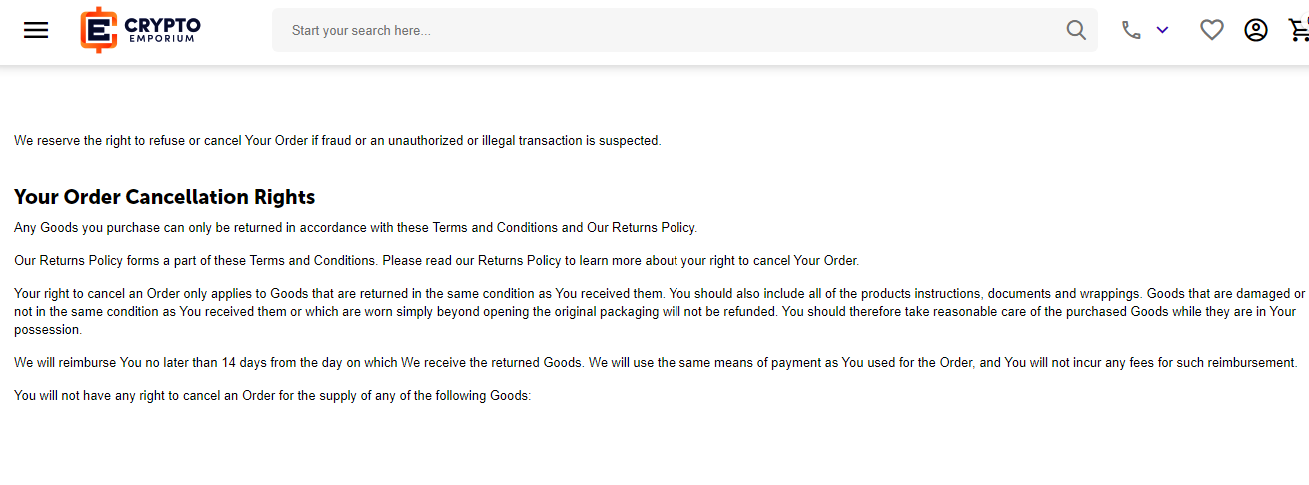The invention of digital payment systems has paved the way for e-commerce to thrive. This trend has facilitated the adoption and usage of cryptocurrencies for payments and transactions.
This guide fully examined all the available crypto e-commerce platforms and handpicked the best among them. Are you looking for an e-commerce store that delivers fast and cost-effective services? This guide is for you.
10 Best Crypto E-Commerce Platforms In 2024
While we explore the full review of the best crypto e-commerce platforms, below is a highlight of the outstanding platforms that made it to the list:
- Shopify – A Safe Crypto Store For Businesses And Independent Merchants
- Overstock.com – Leading Crypto E-Commerce Furniture Retailer
- Newegg – Electronic And Household Items
- Purse.io – Top Peer-to-Peer Crypto E-Commerce Platform
- Etsy – Most Innovative E-Commerce Platform
- BigCommerce – Most Trusted Crypto-based E-Commerce Solution Provider
- Crypto Emporiumb – Best Crypto-Only E-Commerce Store
- WooCommerce – WordPress Crypto E-Commerce Plugin
- Magento – Adobe-Owned Crypto-Based E-Commerce Platform
- PrestaShop – Most Popular E-Commerce Plugin
Best Crypto E-Commerce Platform In 2024 – Full Review
In this session, we will fully review all the best e-commerce platforms that are available for users to explore:
Shopify – A Safe Crypto Store For Businesses And Independent Merchants
Shopify is a world-renowned e-commerce platform that hosts digital stores for businesses and independent merchants. It launched its operation in 2006 as one of the pioneer e-commerce platform providers in the world. The platform started allowing merchants to pay crypto for its service in 2013, and one year later, in 2014, it provided platforms that allowed merchants to accept cryptocurrency from customers.
The interfaces leverage the use of third-party plugins to receive crypto payments from customers at checkout. Store owners can enable or disable the payment option from the admin dashboard. Every store created with the Shopify platform has the capability to accept cryptocurrency. However, the choice to accept crypto or not lies with merchants.
Meanwhile, the range of cryptocurrencies accepted by merchants depend on the payment methods they enable in the admin panel. Methods available on e-commerce sites include Crypto.com, OpenNode, Bit2Me, Coinbase, BitPay, DePay, Strike, Ibex, and Lunu.
These gateways accept a variety of cryptocurrencies, including Binance Smart Chain, Polygon, USDT, Bitcoin, Litecoin, Ethereum, Bitcoin Cash, Tether, USDC, BNB, and XRP. Platforms like Bitpay support up to 20 cryptocurrencies and allow merchants to choose whether to accept the payout in cryptocurrency or their preferred fiat.
Pros
- Supports a wide range of cryptocurrencies.
- Fast payment.
- Wider market coverage.
Cons
- Payment refunds are not automatic.
- Users usually make payments through third-party platforms.
Overstock.com – Leading Crypto E-Commerce Furniture Retailer
Overstock.com is described as a tech-driven retailer that sells a variety of furniture for homes and offices. It was launched in 1999 as a brick-and-mortar furniture retailer and has since grown its brand into a behemoth online furniture business worth billions of dollars. Overstock began accepting cryptocurrencies in 2014, making it one of the first e-commerce platforms to do so.
Despite an intense rumour making the rounds that Overstock wants to drop cryptocurrency as a payment method, the platform still features cryptocurrency as a payment option at checkout. In addition to that, the platform has invested heavily in tZero and Ethereum, which are both blockchain-based projects.
This shows the commitment of Overstock to providing extensive utility for cryptocurrency. However, Overstock cryptocurrency checkout services may not be available in all regions of the world.
Meanwhile, Overstock.com is one of the first e-commerce stores to accept Bitcoin. It has now expanded its crypto support to include Ethereum, Litecoin, Bitcoin Cash, Dash, and all major altcoins. Just recently, it established a partnership with Coinbase to improve cryptocurrency transactions on the platform.
Likewise, Overstock.com also entered into a strategic partnership with ShapeShift, the largest instant crypto exchange in the world. With this partnership, Overstock.com wants to allow users to make payments in any cryptocurrency of their choice and still get their goods delivered.
Pros
- Accepts a vast number of cryptocurrencies.
- Collaborations with Coinbase and ShapeShift.
- Fast payments.
Cons
- Refunds are only made in Bitcoin.
Newegg – Electronic And Household Items
Newegg provides electronics, hardware, and computer accessories to consumers. The company was launched in 2001. Newegg existed before e-commerce started witnessing mainstream adoption in the global market. As of the time of this writing, Newegg operates in more than 17 countries worldwide.
It launched its cryptocurrency initiative in 2014, becoming the first major online retailer to allow customers to pay with cryptocurrency. However, Newegg does not accept cryptocurrency for all categories of transactions. Will Call orders, Newegg Gift Cards, subscription orders, pre-orders, return shipping labels, and the Newegg Mobile app are exempted from the cryptocurrency checkout.
Unlike platforms like Crypto Emporium, Newegg does not have native crypto checkout plugins. However, it leverages Bitpay’s third-party platform to execute cryptocurrency checkout functions. Users can checkout with any of the major cryptocurrencies, including Bitcoin, Bitcoin Cash, Ethereum, Dogecoin, Litecoin, USD Coin, Pax Dollar, Gemini Dollar, Binance USD, DAI, Wrapped Bitcoin, Shiba Inu, ApeCoin, and Polygon.
Refunds and bonuses are processed by the Bitpay platform. However, the process may take longer than expected.
Pros
- Easy and fast transactions.
- Support at least 20 cryptocurrencies.
Cons
- Absence of a native cryptocurrency gateway.
- Refunds might take a while.
Purse.io – Top Peer-to-Peer Crypto E-Commerce Platform
Purse is a peer-to-peer platform that allows users to purchase merchandise on Amazon using cryptocurrencies. Since its inception in 2014, it has continued to earn the trust of over 200,000+ users worldwide and has completed millions of dollars worth of crypto transactions.
Purse provides utility for a wide range of cryptocurrencies by curating a list of merchandise from Amazon. The platform completes customer order requests by matching the order amount with users who have an equal amount in Amazon gift cards.
Purse.io supports only Bitcoin and Bitcoin Cash. Since it’s an escrow platform, users deposit the cryptocurrency in a provided wallet and approve the payout when the order is fully completed. Outside that, Purse usually offers a 15% bonus to cryptocurrency holders for their commitment to its platform.
Pros
- Available across major locations in the world.
- Supports Bitcoin and Bitcoin Cash.
- Allows users to make purchases on Amazon.
Cons
- Limited crypto options.
- It maintains a complex policy for refunds.
Etsy – Most Innovative E-Commerce Platform
Etsy is a global platform that allows sellers to host creative goods. Etsy does not directly engage in the creation or distribution of goods. Rather, it manages a platform that provides an interface where buyers and sellers can interact and transact business.
Meanwhile, Etsy usually charges a listing fee to sellers who list their products on it. Likewise, it takes transaction fees on all completed transactions. The platform initiated its crypto payout in 2015. With its integration of Bitpay, it has continued to process and complete every crypto transaction on its network.
There are two methods of checking out with cryptocurrency via the Etsy platform. The first one is the wallet-to-wallet payment method. Users can send payments to wallets provided by sellers. Here, the seller determines the type of crypto that users must pay.
The other option is known as the Bitpay method. With this method, users can leverage the Bitpay card to make payments. Unlike the wallet-to-wallet payment method, payments can be made through any of the cryptocurrencies supported by Bitpay. Also, Bitpay card holders can pay with cryptocurrency even if the seller does not enable it at checkout.
Pros
- Supports at least 20 cryptocurrencies.
- Available in most countries of the world.
- Features thousands of merchants with a huge array of products.
Cons
- Excessive charges.
- Absence of a native crypto checkout method.
BigCommerce – Most Trusted Crypto-Based E-Commerce Solution Provider
Bigcommerce is a next-generation SaaS platform that integrates many Web 3.0 functionalities. It offers online store creation and other digital services to retailers and enterprises of all sizes. The platform was launched in 2009 as Interspire, with the goal of making it easy for businesses to market and sell online.
The idea has now evolved to become the widely known, publicly traded BigCommerce. As of the time of this writing, BigCommerce provides online store services to over 60,000+ online stores and has a business presence in over 120 countries.
Meanwhile, BigCommerce does not have platform-based support for cryptocurrency checkout. But, you do not have to worry. It has integrated third-party platforms to provide crypto checkout functions for its users. The two checkout providers featured on BigCommerce include Bitpay and CoinPayments. Both providers support over 20 cryptocurrencies and can provide payouts to sellers in fiat.
Pros
- Supports a wide range of crypto assets.
- Easy and fast payments.
- Global presence.
Cons
- Relies heavily on third-party platforms.
- Charges excessive fees for crypto transactions.
Crypto Emporium – Best Crypto-Only E-Commerce Store
Crypto Emporium launched its operations initially in Italy before scaling them to over 120 countries worldwide. At its inception, Crypto Emporium focused on the sale of high-end luxury products. It opened for business in February 2018 as a crypto-only e-commerce platform, selling products that included yachts, watches, electronics, cars, motorbikes, etc. For further details, read our Crypto Emporium review.
Over the years, Crypto Emporium has grown its product line to include a wide range of products and services, thereby positioning itself as one of the best places to spend your Bitcoin. Digital products and online courses are also featured on the platform. It provides features that allow merchants to receive cryptocurrency for merchandise at checkout.
Likewise, it currently positions its brand as a cryptocurrency-only peer-to-peer e-commerce platform, allowing users to make payments in Bitcoin and other cryptocurrencies.
Crypto Emporium is best known for its Bitcoin support. This means you can buy any of your favorite watches with Bitcoin at the store. Beyond that, it also allows users to pay and receive payment in other cryptocurrencies, including Bitcoin ($BTC), Ethereum ($ETH), Tether ($USDT), Dogecoin ($Doge), Litecoin ($LTC), Dash ($Dash), and Ripple ($XRP).
Recently, it made our list of the best stores that accept Dogecoin. Unlike many other crypto e-commerce platforms, it uses a native interface to accept payments from users.
Meanwhile, there are ongoing plans to expand the accepted cryptocurrencies to include more altcoins in the future. It’s one of the few e-commerce platforms with working peer-to-peer crypto payment solutions. Crypto Emporium is relatively new to the crypto e-commerce store business, but it’s growing rapidly to improve its service and optimize its operations.
Pros
- Instant payment method.
- Readily available across most countries of the world.
- Bonus package.
- A wide range of goods.
- Easy-to-use interface.
Cons
- Poor customer support service.
WooCommerce – WordPress Crypto E-Commerce Plugin
WooCommerce is a WordPress e-commerce solution that provides small businesses with product hosting capabilities. It’s an open-source plugin that integrates with the WordPress admin interface to provide a complete e-commerce experience for sellers and buyers.
The platform was launched in 2006 with a focus on theme development for WordPress websites. However, in 2017, it adjusted its business model to focus on e-commerce solutions. At its inception, it only supported the use of fiat at checkout via regular payment gateways like PayPal.
But, with the support of third-party partners, it can now provide a crypto checkout function to sellers. WooCommerce features one of the best crypto exchanges in the world,Coinbase, alongside other third-party platforms like OpenNode, DePay, and HayVN as its crypto checkout providers. Each provider supports virtually all kinds of cryptocurrencies.
Pros
- WooCommerce provides an extensive lineup of crypto payment options.
- Features a wide selection of customizable payment gateways.
Cons
- Users pay extra charges to use its third-party gateways.
Magento – Adobe-Owned Crypto-Based E-Commerce Platform
Magento commenced operations in 2016 as an e-commerce platform provider. The platform was designed as an open source project like WooCommerce but was not intended for WordPress or as a plugin. It was designed as a stand-alone platform-as-a-service (pass).
Meanwhile, around 2018, it was acquired by Adobe in a $1.6 billion deal. Despite Adobe’s acquisition, Magento still focuses on providing e-commerce for B2C and B2B merchants. But, it scaled up its operation to include several business management functions, including online POS.
Part of the initiatives introduced after its acquisition by Adobe is cryptocurrency payment through CoinGate and Coinremitter. These gateways function as Magento 2-compatible plugins. They enable sellers to accept Bitcoin and other cryptocurrencies at checkout.
Pros
- Provides e-commerce services to B2C and B2B merchants.
- Accepts a good number of cryptocurrencies.
- Fast transactions.
Cons
- Recurring charges at checkout.
PrestaShop – Most Popular E-Commerce Plugin
PrestaShop is also very similar to Magento. It was launched in 2006 in Paris as a student project. It provides an independent platform as a service to business owners who want to launch their e-commerce platform without depending solely on WordPress or an e-commerce provider like Amazon.
The platform currently hosts online stores for over 300,000 users across the globe. In the same vein, it offers all the tools needed by a merchant to set up, customize, and manage an online store. PrestaShop’s greatest strength dwells in its ability to support both fiat and crypto payments
Prestashop provides a range of addons that allow customers to checkout with cryptocurrency. Since Prestashop operates the platform-as-a-service (PaaS) model, users have the option of installing the crypto gateway addon of their choice.
One of the most popular gateways on the platform is CoinGate, which supports over 70 cryptocurrencies. While Prestashop addons are provided for free, the services rendered by the addons are not free.
Pros
- Available in several countries.
- Support a variety of crypto assets.
- Addons are provided for free.
Cons
- Users incur extra charges for using its crypto gateway.
How We Selected The Best Crypto E-Commerce Platforms
Not all crypto e-commerce stores deliver great user experience. In fact, there are e-commerce stores with more downsides than upsides. Nonetheless, each of the e-commerce platforms featured in this guide has unique features that set them apart from the rest on the internet.
Below are the criteria we considered while researching the best e-commerce stores that are available to users.
Variety of Products
The store we picked must carry more than one category of product and service. Even if it’s in a particular sector like tech, it still needs to feature more than one tech products, like phones, computers, and other electronic gadgets.
User Experience
We checked for websites with easy navigation and an excellent user experience. We also looked into third-party reviews.
Range of Cryptocurrencies Accepted
We also looked for stores that support a wide range of cryptocurrencies. Most of the crypto e-commerce platforms included in our list support at least two or more cryptocurrencies.
There are e-commerce platforms on our list that even accept 70+ cryptocurrencies.
Platform Reach
We also consider the coverage of each of the platforms. Platforms with a presence in more countries stand a better chance of sustaining their business for much longer than platforms in fewer countries.
User Data Security
We also gave utmost priority to platforms with established security infrastructures to protect the data of users and prevent third-party infringement on user privacy. Even though BigCommerce partners with third parties like Wish, Inc., there have not been any reports of a data or privacy breach.
What Is A Crypto E-Commerce Platform?
Crypto e-commerce platforms are online stores or other digital business models that accept cryptocurrency as payment for goods or services. They are mostly built on blockchain infrastructures or Web 2.0 technologies. Irrespective of the underlying technologies of these sites, one feature they all share is the availability of cryptocurrency payment interfaces.

Many e-commerce sites only feature crypto wallets or wallet addresses where users deposit cryptocurrencies at checkout. Other advanced crypto ecommerce sites, like Crypto Emporium, have native tokens that users may use to make payments for goods and services. The niche is quite new, and we’re witnessing several innovations as it grows.
How Do I Accept Crypto Payments On Stores?
As an e-commerce merchant, there are several ways to enable the cryptocurrency checkout function on major e-commerce platforms. The options available to merchants are explained below.
Platform-based Crypto Gateway
Some e-commerce platforms provide an inbuilt gateway that allows merchants to accept cryptocurrency at checkout. They are often referred to as crypto-only e-commerce platforms. An example is the popular Crypto Emporium e-commerce website. Merchants do not have to enable the crypto gateway before it works. It is automatically enabled at account setup since it’s the only available gateway on the platform.
Third-party Crypto Gateway
Another option is to activate the third-party crypto payment gateway. Usually, this is done through the admin dashboard. The platform usually features a number of third-party crypto checkout providers like CoinGate, BitPay, Depay, Opennode, and Coinbase.
Meanwhile, there are several other third-party crypto gateway providers. Once a merchant activates the preferred gateway, users will be able to make payments via cryptocurrency when purchasing at the store. However, the third-party gateway may come with additional charges.
Wallet-2-Wallet
Platforms like WooCommerce allow merchants or businesses to use the plug-in to provide e-commerce on WordPress. If a merchant doesn’t want the third-party platforms provided by the platform, there is an option to toggle on the wallet-to-wallet option. With this, merchants will have to provide a valid cryptocurrency address where customers can make payments in cryptocurrency.
Peer-2-Peer Feature
This feature is only available on a few crypto e-commerce platforms like purse.io. The platform serves as an escrow between users who are purchasing items from e-commerce platforms.
Meanwhile, the user placing the order is expected to send the crypto to the platform, which holds the crypto until the ordered item is successfully delivered. Here, the merchandise may not be in the direct possession of the vendor. However, it still falls within the e-commerce category.
How To Find The Best Crypto E-Commerce Platform For You
Finding the product you want to buy is relatively easy. The hardest part of your online shopping in the era of cryptocurrency is finding the best platform that provides excellent service to shoppers. In this session, we cover all the factors you need to consider while picking an e-commerce platform.
Crypto Payment Policy In Your Region
The most important thing to know ahead of time is if you can complete the transaction in crypto. Many online shoppers are not aware of the crypto policies that are obtainable in their jurisdictions. The best place to start your research is within the policies of your region to ascertain if the cryptocurrency you wish to use for your purchase is allowed.
Range Of Cryptocurrencies Supported
The second important tip to keep in mind is the number or range of cryptocurrencies the platform supports. You want to pick a cryptocurrency e-commerce platform that supports the cryptocurrency in your possession.
E-commerce platforms that support fewer numbers of cryptocurrencies may limit the types and volumes of transactions you can do. Read our guide to discover how you can buy cryptocurrency for your purchases on e-commerce platforms.
Return And Refund Policy
One of the biggest challenges customers may face when transacting with cryptocurrencies is the refund and return policy of each platform. Some platforms leave the policies entirely at the discretion of the merchant.
Customers’ Review
Before proceeding to purchase or transact on any crypto-ecommerce platform, it’s best to read what other users are saying about the platform on sites like Trustpilot. It’s best to stay away from sites with excessively negative reviews.
Customer Service
Test the customer service of the platform before proceeding with the purchase, as this is essential for product returns and refunds. Effective customer service makes it easy to withdraw your crypto and get the product back to the vendor if you’re dissatisfied with the transaction.
Benefits Of Using Crypto E-Commerce Platforms
Several governments around the world are against the idea of using cryptocurrency for mainstream transactions. The obvious fact remains that most of the countries that stand against the adoption of crypto may be oblivious of the benefits that come with it. Meanwhile, below are some of the advantages that come with the use of cryptocurrencies in e-commerce.
Fast Transactions
The first observable advantage of cryptocurrency over fiat is the speed at which transitions are completed. Fiat transactions require several third-party institutions and infrastructures to establish trust and ensure that the records of the transactions are being carried out.
However, with cryptocurrency, the blockchain technology serves as the immutable evidence that the transaction was authorized. Therefore, the time taken and the path followed from the beginning of the transaction are much shorter, making it extremely fast compared to traditional banking systems.
Peer-2-peer Transactions
One of the most important parts of any transaction is privacy. Most e-commerce platforms do not have enough infrastructure to protect the privacy of customers and merchants due to third-party payment gateways and records of transactions.
Cryptocurrencies, on the other hand, provide full anonymity to users through the peer-to-peer functionality that ensures that transactions truly happen between sellers and buyers only, without passing through any third-party platform.
Security
Apart from sites that are entirely dedicated to scams and other evil vices, all crypto-based e-commerce sites are secured. The underlying blockchain technology powering the transactions makes it impregnable to attacks and data scraping.
Lower Cost
The cost of crypto transactions is much lower for customers than fiats. When dealing with fiats, you get charged by your bank for the transaction, and the payment gateway also charges you for using the platform.
However, when transacting in cryptocurrency, there are zero charges on the transaction. Users are only made to pay while dealing with third-party gateways.
Decentralised Transactions
There’s a level of freedom that comes with the use of cryptocurrency. Users don’t depend on government-printed or regulated currencies to make purchasing decisions.
Also, there are no restrictions to how and where you can spend your cryptocurrencies, except where you’re within regions and countries that have established laws against the use of cryptocurrencies.
Conclusion
With over 300 million people holding cryptocurrency today, there’s no doubt that the asset is fast becoming the only viable medium of transactions worldwide. Hence, it is not surprising that most e-commerce providers now allow stores hosted on their platforms to accept payment in cryptocurrencies.
In this guide, we compiled the list of the best crypto c-commerce platforms. While there may be other excellent crypto-ecommerce platforms besides the ones featured in our list, we have limited our choices to the 10 highlighted above because they excelled at the majority of our selection criteria. We also believe that the platforms featured on the list are constantly expanding and will add more features to benefit customers in the future.
FAQs
Are crypto e-commerce platforms the best for online purchases?
Although Crypto-ecommerce platforms have their weaknesses, they are undoubtedly the best for online purchases. Some of the available options that you can consider are BigCommerce, Crypto Emporium, WooCommerce, Overstock, Shopify, and other ones reviewed in this guide. It’s difficult to ascertain which sits at the top of the list as the best of them all. However, this guide has also provided some details to look out for when selecting the e-commerce platform that’s best for you.
What Apps Let You Pay With Crypto?
Most of the crypto e-commerce platforms featured on this list provide mobile apps that also accept cryptocurrency at checkout. Shopify app, Overstock mobile platform, BigCommerce, and WooCommerce are some of the mobile-enabled platforms that accept cryptocurrencies on both Android and iOS. There are thousands of generic apps that are not in the e-commerce space but still accept cryptocurrencies for in-app purchases. However, they are not covered in this guide.
Does Shopify Accept Crypto?
Yes. Shopify is one of the biggest brands in the world to have embraced the idea of accepting cryptocurrency payments for services. It launched its crypto payout initiative in 2020. The platform partnered with the likes of CoinPayments, Coinbase Commerce, Bitpay, etc. to allow crypto holders to make payments in any cryptocurrency of their choice.


















